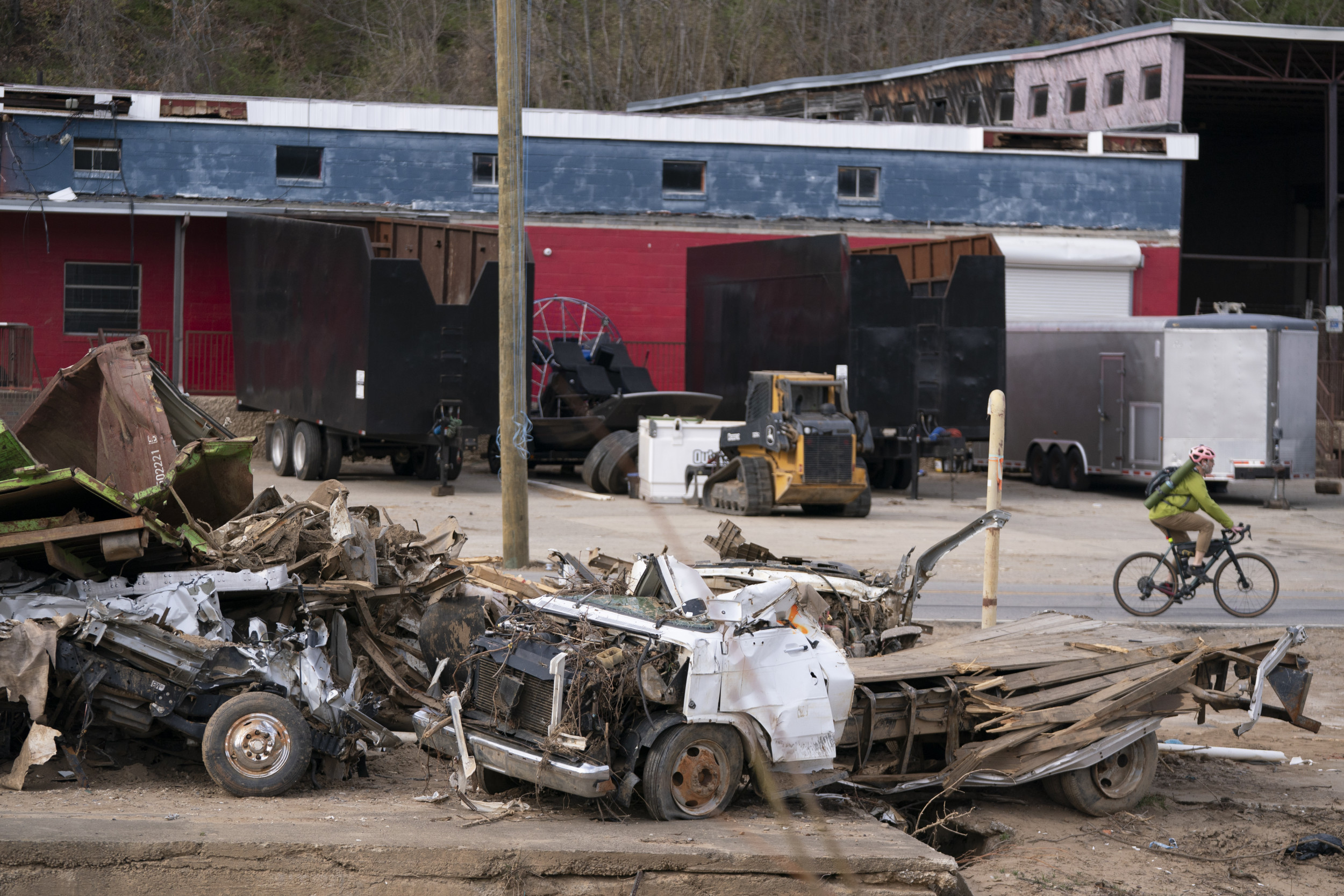Democratic Gov. Josh Stein announced Friday that the Federal Emergency Management Agency (FEMA) has denied North Carolina’s request to extend the full reimbursement period for Hurricane Helene recovery efforts.
Why It Matters
In the aftermath of Hurricane Helene, which struck in September 2024, then-presidential candidate Donald Trump voiced sharp criticism of FEMA’s response in the swing state of North Carolina, accusing the agency of being too slow to release recovery funds and failing to coordinate effectively with state officials. Trump repeatedly claimed that federal bureaucracy was delaying critical aid, saying in one press briefing, “The people of North Carolina deserve faster, better action. FEMA needs to cut the red tape and get the job done.”
Crushed vehicles and storm debris sit along the Swannanoa River in a landscape scarred by Hurricane Helene on March 24, 2025, in Asheville, North Carolina.
AFP/Getty Images
He also suggested that political bias might be influencing the pace of assistance, given Trump’s staunch support in hard-hit areas of western North Carolina, though FEMA denied the allegations.
Trump secured North Carolina’s 15 electoral votes in the past three presidential elections. In 2016, he defeated Hillary Clinton with 49.83 percent of the vote to her 46.17 percent, a margin of 3.66 percentage points. The 2020 election saw a tighter race, with Trump narrowly surpassing Joe Biden by 1.34 percentage points. In the 2024 election, Trump expanded his lead, securing 50.86 percent of the vote against Kamala Harris’s 47.65 percent, marking his third consecutive win in the state.
What to Know
Swathes of the Southeast were devastated in late September by Hurricane Helene, which left 219 people dead and caused billions of dollars’ worth of damage.
Helene was the deadliest hurricane to strike the mainland U.S. since Katrina in 2005, with Florida, Georgia, North Carolina South Carolina and Virginia particularly badly hit.
Helene caused widespread devastation across North Carolina, resulting in an estimated $8.4 billion in total damages. The storm brought torrential rainfall, historic flooding and destructive winds that damaged thousands of homes, overwhelmed local infrastructure, and left large portions of the state without power for days.
Key industries, including agriculture and manufacturing, suffered severe losses, and dozens of counties were declared federal disaster areas. The storm put immense pressure on both state and federal resources.
Recovery efforts remain ongoing months after Helene made landfall, with many communities still working to repair roads, rebuild housing and restore public services. While FEMA and state agencies have deployed aid, delays in federal reimbursements have slowed progress.
North Carolina officials continue to call for extended financial support, particularly for rural areas where rebuilding has been slow. Nonprofits and volunteer groups have played a crucial role in filling gaps left by strained government resources, while local leaders emphasize the need for long-term investment in resilient infrastructure to better withstand future storms.
Last month, the Trump administration also turned down a request from Georgia Gov. Brian Kemp for a second deadline extension to apply for relief from the state following Hurricane Helene.
What People Are Saying
Stein posted on X, formerly Twitter, “Today, I learned that FEMA refused our request to extend its 100% reimbursement period for another 180 days. I got this news while I was in Newland with families who lost their homes in the storm. The need in western North Carolina remains immense — people need debris removed, homes rebuilt, and roads restored. I am extremely disappointed and urge the President to reconsider FEMA’s bad decision, even for 90 days. Six months later, the people of western North Carolina are working hard to get back on their feet; they need FEMA to help them get the job done.”
In the aftermath of the storm, Trump alleged that the federal government and North Carolina Governor Roy Cooper were, “going out of their way to not help people in Republican areas.”
What Happens Next
President Trump and Homeland Security Secretary Kristi Noem have publicly discussed plans to eliminate the Federal Emergency Management Agency (FEMA), citing concerns over inefficiency and bureaucracy. During a Cabinet meeting in March 2025, Noem stated, “We’re going to eliminate FEMA,” signaling a significant shift in federal disaster management policy.
This announcement followed Trump’s earlier remarks during a visit to Hurricane Helene-affected areas in North Carolina, where he criticized FEMA’s performance, stating, “FEMA has been a very big disappointment. They cost a tremendous amount of money. It’s very bureaucratic, and it’s very slow.” He further suggested that disaster response should be primarily managed by state governments, emphasizing, “I think that when there’s a problem with the state, I think that that problem should be taken care of by the state.”
Newsweek has reached out to the White House and FEMA via email on Friday for comment.
This is a developing news story and will be updated as more information is available.
Update: 4/11/25, 6:12 p.m. ET: This article has been updated with additional information.
Update: 4/11/25, 6:38 p.m. ET: This article has been updated with additional information and remarks.





